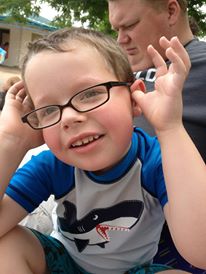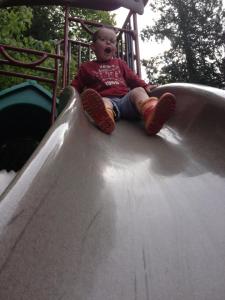Explaining Autism to Others
Do you get tired of explaining about your child’s Autism to people? I get rather weary of it. It just comes naturally to me now… you go into a new situation, you explain to the person in charge your son has Autism, you give them a few pointers, they usually look at you with a smile and a nod of their head because they do not know what else to do, but deep down you know they are either freaking out or thinking you need to just relax and back-off.
Back-off. Those words haunt me today; everyday. I put my son in swim lessons- it is his first time.  As we drive there I think through what I need to tell the instructor. We get there and I talk with her and get the smile, nod, and blank look. I try giving a few pointers a few times, and then it hits me… why? Is it necessary that I give pointers? Is it necessary that I explain beforehand that he has Autism?
As we drive there I think through what I need to tell the instructor. We get there and I talk with her and get the smile, nod, and blank look. I try giving a few pointers a few times, and then it hits me… why? Is it necessary that I give pointers? Is it necessary that I explain beforehand that he has Autism?
Personal Thoughts vs. Reality
Yes, it usually is important that I explain he has Autism. Though I fully admit I want to explain it to defend his actions- that way people do not think he is a bad kid that is not disciplined and is hyperactive and disobedient. Is that selfish? I mean, after all, it does reflect back to me. I always tell myself no, ultimately it is best for him and people generally get pretty upset if I purposefully neglect to explain my son to them beforehand.
But the question still remains, should I give pointers and suggestions? Often times I find people who can think of something intelligent to say ask me for ideas and how to accommodate him. This always makes me feel relaxed and I feel like they go the extra measure to help him and make sure it is successful for him. Maybe sometimes the ones who do not ask questions need to realize for themselves it is ok to ask questions. Are they scared to ask? Maybe it seems rude to ask? Do they lack the knowledge of Autism and simply have no idea what to do and say?
Maybe it is like seeing someone for the first time after they have lost a spouse or loved one. What do you say to them? Nothing will make them feel better, and it is always that awkward moment. So if I say to someone, “My son has Autism” what should their response be? Would it be rude to say, “Sorry he has Autism” or “Oh what a shame.” What is it I want to hear? I certainly do not want pity. Is this how someone feels after a loved one has passed away? What do they want to hear?
So in reality, I suppose people want to know ahead of time that my son has Autism so they know he has sensory issues and is not simply being defiant (though at times I know he is… like this morning when his swim instructor told him to blow bubbles in the water and he insisted he did not want to blow bubbles but was ready to learn how to dive). (I am sitting here laughing right now… why do I always laugh when I think about my son being defiant? Maybe this is not healthy…) Yes, people want to know. Should I offer suggestions? Well, I suppose I need to think if it is relevant and necessary. Is it necessary for his swim instructor? Maybe not as much. Would it be for his school teacher? I would think so.
Emotions
It is draining explaining Autism so often, nearly every day. My husband and I believe we can use our son’s Autism for God’s glory and to help others understand Autism- this is why I do what I do. But emotionally it can get so tiring.
I dread it when people say to me, “Oh he seems fine” or “Oh he is high functioning”… maybe they do not know what else to say. And really, what is “high functioning?” Perhaps another post on my blog at a later time. I think it is all in the scope of the beholder, but like I said, we will cross that another time.
Do you ever find yourself holding back on doing things such as outings because you simply do not feel like explaining Autism today? Yes, I admit I feel this way often. I do not want to go to the park because I get the strange looks from other moms and kids, and I get the “your kid is throwing rocks at my kid” and then I have to explain. I do not feel like going anywhere that requires standing in line because he gets hyperactive and asks millions of questions, generating more curious looks and annoyed people who want him to stand still and shut up.
There are days I simply cringe at the word Autism. I love my son; I love everything about him and who he is. But it is emotionally draining at times. People simply are not well educated on Autism and thus they just do not understand. I do not blame them for their lack of knowledge on Autism. As a society we are becoming more aware of Autism and perhaps my son’s generation will understand as they grow up and become adults what Autism is and how to work with those afflicted with it.
But for now I cringe and smile and take my deep breaths. I suppose soon we will need to teach and explain to my son about his Autism, but not teach him to use it as an excuse but rather as a tool. Good luck to us! And tomorrow I think I will sit back and say nothing unless the swim instructor asks for help. I will be one of the other moms with my nose in a book, every now and then peering over to see what he is doing. But the only difference is I will have gentle tears in my eyes when he accomplishes something, such as blowing those darn bubbles, because this is so huge for him! Any small accomplishment is critical for us; we treasure them and tell our whole family about it. My facebook status this evening was about my son trying (after much persuasion) sloppy joes for dinner, and he actually liked it! Grand for us, boring for others, I know. Accomplishment… such a big word for such a small kid.
Final Thoughts
I have no final thoughts except I wish people were more educated about Autism. Wouldn’t it be wonderful to drop him off somewhere and simply say, “He has Autism” and to actually have someone respond back, “No problem, I know how to work with Autism.” Maybe someday.
Until then, I educate and I am the advocate for my son and for anyone else out there in my position. Autism. It is my life. It is my son’s life. It is my husband’s life. But we will not allow it to control us, we will dominate it. Because it is our son, and we love him!




